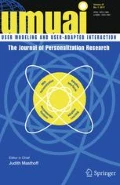Abstract
User modeling research can benefit from formal automated reasoning tools. However existing formal tools may need to be modified to suit the needs of user modeling. Theorist is a simple framework for default reasoning. It can be used as a tool for building and maintaining a user model, and as a model of a user's default reasoning. To apply Theorist to both tasks, we develop Nested Theorist (NT), a simple tool based on Theorist that allows default reasoning on arbitrarily-many levels. We extend NT in two ways: we allow prioritized defaults, and we allow reasoning about agents with limited reasoning capabilities. This paper focusses on applications, and uses wide-ranging examples from user-modeling literature to illustrate the usefulness of the tools presented.
Similar content being viewed by others
References
Appelt, Douglas E. and Konolige, Kurt: 1988, ‘A Practical Nonmonotonic Theory for Reasoning About Apeech Acts’. In: Proceedings of the Twenty-sixth Annual Meeting of the Association for Computational Linguistics, Buffalo, NY, pp. 170–178.
Brewka, Gerhard: 1989, ‘Preferred Subtheories: An Extended Logical Framework for Default Reasoning’. In: Proceedings of the Eleventh International Joint Conference on Artificial Intelligence, 1989, pp. 1043–1048.
Chin, David N.: 1988, ‘Exploiting User Expertise in Answer Expression’. In: Proceedings of the Seventh National Conference on Artificial Intelligence, Saint Paul, MN, pp. 756–760.
Chin, David N.: 1989, ‘Knome: Modeling What the User Knows in UC’. In: Alfred Kobsa and Wolfgang Wahlster (eds.): User Models in Dialog Systems. Springer, Berlin-New York.
Cohen, Robin, Jones, Marlene, Sanmugasunderam, Amar, Spencer, Bruce and Dent, Lisa: 1989, ‘Providing Responses Specific to a User's Goals and Background’. The International Journal of Expert Systems: Research and Applications 2, 135–162.
Etherington, David W.: 1988, Reasoning with Incomplete Information. Pitman Research Notes in Artificial Intelligence, London: Pitman/San Mateo, CA: Morgan Kaufmann.
Fagin, Ronald and Halpern, Joseph Y: 1985, ‘Belief, Awareness, and Limited Reasoning: Preliminary Report’. In: Proceedings of the Ninth International Joint Conference on Artificial Intelligence, 1985, pp. 491–501.
Fagin, Ronald and Halpern, Joseph Y.: 1988, ‘Belief, Awareness, and Limited Reasoning’. Artificial Intelligence 34 (1), 39–76.
Finin, Tim W. and Drager, David: 1986, ‘GUMS1: A General User Modeling System’. In: Proceedings of the Sixth Canadian Conference on Artificial Intelligence, 1986, pp. 24–30.
Goebel, Randy: 1989, ‘A Sketch of Analogy as Reasoning with Equality Hypotheses’. In: K. Jantke (ed.): Analogical and Inductive Inference, Volume 397 of Lecture Notes in Computer Science, Berlin: Springer-Verlag, pp. 243–253.
Hadley, Robert F.:. 1986, ‘Fagin and Halpern on Logical Omnisciences: A Critique with an Alternative’. In: Proceedings of the Sixth Canadian Conference on Artificial Intelligence, 1986, pp. 49–56.
Hadley, Robert F.: 1988, ‘Logical Omniscience, Semantics and Models of Belief’. Computational Intelligence 4 (1), 17–30.
Halpern, Joseph Y. and Moses, Yoram O.: 1985, ‘A Guide to the Modal Logics of Knowledge and Belief’. In: Proceedings of the Fifth International Joint Conference on Artificial Intelligence, 1985.
Hayes, Patrick J.: 1977, ‘In Defence of Logic’. In: Proceedings of the Fifth International Joint Conference on Artificial Intelligence, Cambridge, MA, pp. 559–565.
Hoenkamp, Edward: 1987, ‘An Analysis of Psychological Experiments on Non-monotonic Reasoning’. In: Proceedings of the Tenth International Joint Conference on Artificial Intelligence, 1987, pp. 115–117.
Jones, Marlene and Poole, David: 1985, ‘An Expert System for Educational Diagnosis Based on Default Logic’. Proceedings of the Fifth International Conference on Expert Systems and Their Applications, pp. 673–683.
Joshi, Aravind K., Webber, Bonnie, and Weischedel, Ralph M.: 1984, ‘Preventing False Inferences’. In: Proceedings of the Tenth International Conference on Computational Linguistics, Stanford, CA, pp. 134–138.
Konolige, Kurt: 1982, ‘A First-order Formalisation of Knowledge and Action for a Multi-agent Planning System’. Machine Intelligence 10, 41–72.
Konolige, Kurt: 1985, ‘Belief and Incompleteness’. In: Jerry R. Hobbs and Robert C. Moore (eds.): Formal Theories of the Commonsense World, Ablex Publishing Corporation, Norwood, NJ, pp. 359–404.
Konolige, Kurt: 1986a, A Deduction Model of Belief. Pitman Research Notes in Artificial Intelligence, London: Pitman/San Mateo, CA: Morgan Kaufmann.
Konolige, Kurt: 1986b, ‘What Awareness Isn't: A Sentential View of Implicit and Explicit Belief’. In: Joseph Y. Halpern (ed.): Proceedings of the First Conference on Theoretical Aspects of Reasoning about Knowledge, Monterey, CA, pp. 241–250.
Lakemeyer, Gerhard: 1987, ‘Tractable Meta-reasoning in Prepositional Logics of Belief’. In: Proceedings of the Tenth International Joint Conference on Artificial Intelligence, 1987, pp. 402–408.
Levesque, Hector J.: 1984, ‘A Logic of Implicit and Explicit Belief’. In: Proceedings of the Fourth National Conference on Artificial Intelligence, Austin, TX, pp. 198–202.
Levesque, Hector J. and Brachman, Ronald J.: 1985, ‘A Fundamental Tradeoff in Knowledge Representation and Reasoning’. In: Ronald J. Brachman and Hector J. Levesque (eds.): Readings in Knowledge Representation, Morgan Kaufmann Publishers, Inc., Los Altos, CA, pp. 42–70.
Perrault, C. Raymond: 1988, ‘An Application of Default Logic to Speech Act Theory’. Technical Report CSLI-87-90, Center for the Study of Language and Information.
Poole, David: 1988, ‘A Logical Framework for Default Reasoning’. Artificial Intelligence 36(1), 27–47.
Poole, David, Goebel, Randy, and Aleliunas, Romas: 1987, ‘Theorist: A Logical Reasoning System for Defaults and Diagnosis’. In: Nick Cereone and Gordon McCalla, editors, The Knowledge Frontier: Essays in the Representation of Knowledge, New York: Springer, pp. 331–352.
Reiter, Raymond: 1980, ‘A Logic for Default Reasoning’. Artificial Intelligence 13, 81–132.
Rich, Elaine: 1979, ‘User Modelling Via Stereotypes’. Cognitive Science 3, 329–354.
Shoham, Yoav and Moses, Yoram O.: 1989, ‘Belief as Defeasible Knowledge’. In: Proceedings of the Eleventh International Joint Conference on Artificial Intelligence, 1989, pp. 1168–1172.
van Arragon, Paul: 1990, ‘Nested Default Reasoning for User Modeling’. Technical Report CS-90–25, University of Waterloo, Waterloo, Ontario, Canada.
Wilks, Yorick and Ballim, Afzal: 1987, ‘Multiple Agents and the Heuristic Ascription of Belief’. In: Proceedings of the Tenth International Joint Conference on Artificial Intelligence, 1987, pp. 118–124.
Wilks, Yorick and Bien, J. S.: 1983, ‘Beliefs, Points of View, and Multiple Environments’. Cognitive Science 7, 95–119.
Author information
Authors and Affiliations
Rights and permissions
About this article
Cite this article
Van Arragon, P. Modeling default reasoning using defaults. User Model User-Adap Inter 1, 259–288 (1991). https://doi.org/10.1007/BF00141082
Received:
Revised:
Issue Date:
DOI: https://doi.org/10.1007/BF00141082




